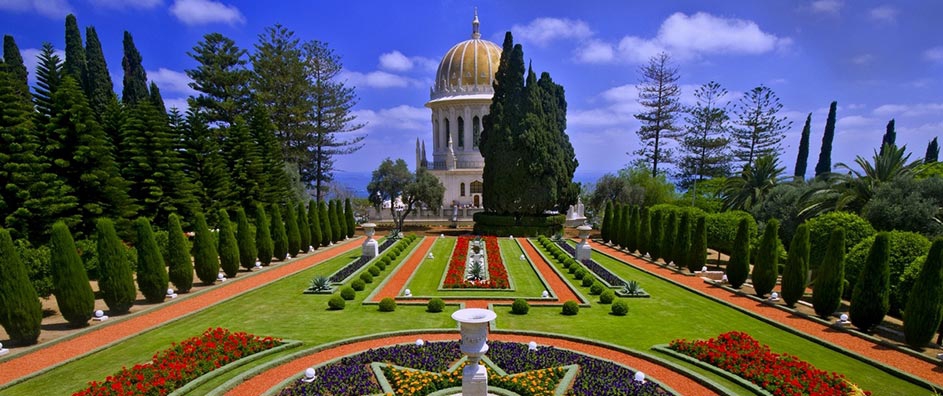The views expressed in our content reflect individual perspectives and do not represent the authoritative views of the Baha'i Faith.
In all the world’s religions, where the moment of the birth of the founder is known, or where a day is fixed by custom, the people celebrate that day with enthusiasm and joy. They tell stories of the many miracles that accompanied the birth of the prophet, and recount the blessings still to be had on that day.
The traditions of Buddhism tell us that when Prince Siddhartha was born:
The child came forth from the womb like the rising sun, bright and perfect. All the worlds were flooded with light. The blind received their sight by longing to see the coming glory of the Lord; the deaf and dumb spoke with one another of the good omens indicating the birth of Buddha. The crooked became straight; the lame walked. All prisoners were freed from their chains and the fires of all the hells were extinguished… The cries of the beasts were hushed; all malevolent beings received a loving heart, and peace reigned on earth. – The Gospel of Buddha, pp. 7-8.
Of course, all of Western civilization has been affected by the story of the birth of Jesus, celebrated every year at Christmas. The Gospel of Luke tells us that on the night of Jesus’ birth:
There were shepherds out in the fields, keeping watch through the night over their flock. Suddenly an angel of the Lord appeared to them, and the glory of the Lord shone around them. They were terrified, but the angel said: “Do not be afraid; I bring you good news, news of great joy for the whole nation. Today there has been born to you in the city of David a deliverer—the Messiah, the Lord. This will be a sign for you: you will find a Baby wrapped in swaddling clothes, and laying in a manger.
All at once there was with the angel a great company of the heavenly host, singing praise to God: “Glory to God in highest heaven, and on earth peace to all in whom he delights.
…They hurried off and found Mary and Joseph, and the baby lying in the manger. When they saw the child, they related what they had been told about him; and all who heard were astonished at what the shepherds said. – Luke 2:8-18.
For Baha’is, such miracle stories are the parables of past dispensations, metaphors—and splendid ones—intended to flag the significance of an event for the simpler folk in simpler times. Nevertheless, we each manage to find our own miracles. Well might we ponder the hours and dates of the births of Baha’u’llah and the Bab with astonishment:
The Revelation which, from time immemorial, hath been acclaimed as the Purpose and Promise of all the Prophets of God, and the most cherished Desire of His Messengers, hath now, by virtue of the pervasive Will of the Almighty and at His irresistible bidding, been revealed unto men. The advent of such a Revelation hath been heralded in all the sacred Scriptures. – Baha’u’llah, Gleanings from the Writings of Baha’u’llah, p. 5.
For the Baha’i world, however, the real miracle of the Twin Holy Days is the miracle of hope ever found at the birth of any child. In this case, the child—Baha’u’llah, the most recent messenger and founder of a global Faith—became the channel of God’s grace to humanity. His gift will be the unity of all peoples, the fulfillment of the age-old promise of the Kingdom of God come to earth. That is the miracle we celebrate on these special days.
 With the birth of Baha’u’llah at the hour of dawn, on November 12, 1817, and the birth of the Bab two years later in the hours just before dawn, on October 20, 1819, Baha’is believe the means for the establishment of the unity of humanity came into being. Soon would the hatreds which divided the peoples of the world be overcome, the fanaticism that separated them be annulled, their prejudices be transcended, and their strangeness be erased. Soon would the great call for the unity of all peoples and cultures, all nations and religions be raised.
With the birth of Baha’u’llah at the hour of dawn, on November 12, 1817, and the birth of the Bab two years later in the hours just before dawn, on October 20, 1819, Baha’is believe the means for the establishment of the unity of humanity came into being. Soon would the hatreds which divided the peoples of the world be overcome, the fanaticism that separated them be annulled, their prejudices be transcended, and their strangeness be erased. Soon would the great call for the unity of all peoples and cultures, all nations and religions be raised.
Of course, no distinction of station can be made between any of the prophets of God. No Baha’i can claim that the stations of the Bab or Baha’u’llah are superior to the stations of any other of God’s messengers. It is only their mission which is distinctive. These were the first of the prophets of God to be charged with uniting all of humanity, the first whose message was intended not for one people or culture, one language or nation only, it was for all peoples—Muslim and Jew and Confucianist, African and Indian and European. The coming of age of the human species, the time when the human race might recognize itself as one, discover its fullness and its common humanity, had arrived.
As such, the Baha’i Twin Holy Days—accounted as one in God’s eyes—mark the first universal holy day to be vouchsafed to us by a loving God.
Here is the first day in human history which can be celebrated as sacred by all peoples, no matter what their background. Equally here, the Jew may discover the birth of the Messiah and the Christian the return of Christ. The Muslim might celebrate the reappearance of the Hidden Imam or the birth of the promised Qa’im. The Zoroastrians can rejoice at the birth of their king, the Shah Bahram; the Buddhist can find the Maitreya Buddha, the supremely enlightened One; the Hindu recognize the reincarnation of Krishna, born to reestablish righteousness on earth.
As such, this day might be seen as the first event in human history which can be claimed as their own by people of all traditions and all cultures.
This article was adapted for BahaiTeachings.org, with the publisher’s permission, from the Kalimat Press book Twin Holy Days.
















Comments
Sign in or create an account
Continue with Googleor